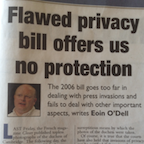 The drumbeats for privacy legislation can once again be heard around Leinster House. I did a radio interview with Matt Cooper on Today FM’s The Last Word yesterday evening; and I have an op-ed about it in today’s Irish Examiner (.doc here):
The drumbeats for privacy legislation can once again be heard around Leinster House. I did a radio interview with Matt Cooper on Today FM’s The Last Word yesterday evening; and I have an op-ed about it in today’s Irish Examiner (.doc here):
Flawed privacy bill offers us no protection
… the bill is unnecessary to cover the publication of the topless photographs, as Irish law already provides a remedy. Worse, the bill goes too far in dealing with press invasions of privacy; and it fails to deal with many other important aspects of privacy. …
A privacy bill is necessary. However, the one being proposed by the minister is not it. It will need a lot of work if it is to protect our privacy properly.
Links: here are some links to the cases and materials to which I refer in the article:
The Privacy Bill, 2006 is here. An op-ed I wrote at the time is here.
The Minister’s Press Release is here.
I have blogged about the photograph of the GAA player, Sinnott v Carlow Nationalist, here, here, here, here, here, here, and here.
The nursing home case is Cogley v RTÉ [2005] 4 IR 79, [2005] IEHC 180 (8 June 2005).
The case relating to the priest’s affair is Herrity v Associated Newspapers [2008] IEHC 249 (18 July 2008)),
I blogged about the Minister’s comments last March here, republished here.
The revised Privacy Bill, 2012 introduced by Senator Norris is here.
The Data Protection Commissioner’s website is here.
CCTV in Ireland is overseen by the Department of Justice.
A model for the Privacy Commissioner discussed in the article is the Office of the Privacy Commissioner of Canada.
Bonus links: (i) other pieces in the Irish Examiner:
Colette Browne: Let’s dispense with hypocrisy over publication of Kate’s topless photos
Juno McEnroe: Shatter vows to put end to ‘creepy keyhole journalism’
Bonus links: (ii) similar pieces in the Irish Times:
Jennifer O’Connell: Fascination with Kate’s breasts and Karen’s clothes makes idiots of us all
Vincent Browne: Media continues to fail to hold powerful to account
Editorial 1: A discredited Bill
Editorial 2: DNA database
I think there is an irony in the alignment of these two editorials. I agree with the first editorial that the Privacy Bill is discredited and “a serious attack on the freedom of the press” which would “become a vehicle simply for the rich and powerful … secretly to muzzle press investigation”. But there is no recognition in the second editorial that a DNA database raises profound privacy concerns. A modern DNA database may indeed represent a necessary investment in crime detection, but it is also an example of the real challenges to privacy posed by the power of the State.
As a geneticist, the idea of a DNA database helping to solve crime in any way is laughable. Not only are they a massive invasion of orivacy and personal bodily integrity, they provide a route to false incrimination on a massive scale.
The supposed reliability and conclusiveness of dna fingerprinting is based on the assumption of a perfect, reproducible result, but the methods used are infamously prone to error and irregularity, even by experienced users.
The standards applied to DNA as evidence are also laughably terrible; take Amanda Knox, who nearly was sent to prison for first degree murder on the basis that her DNA was on the murder weapon…a kitchen knife that she and her deceased roommate would have handled every day. Common sense abandons juries and prosecutors when ‘DNA’ is evoked.
Add to that the trivial ease with which I could forge a DNA fingerprint for someone else, and you have a recipe for disaster.
So, don’t apologise for DNA databases by buying the hype. They offer only the impression of solving crime, but instead elevate a decent ancillary form of evidence to judge-and-jury status. We must not allow one to be created or used here.